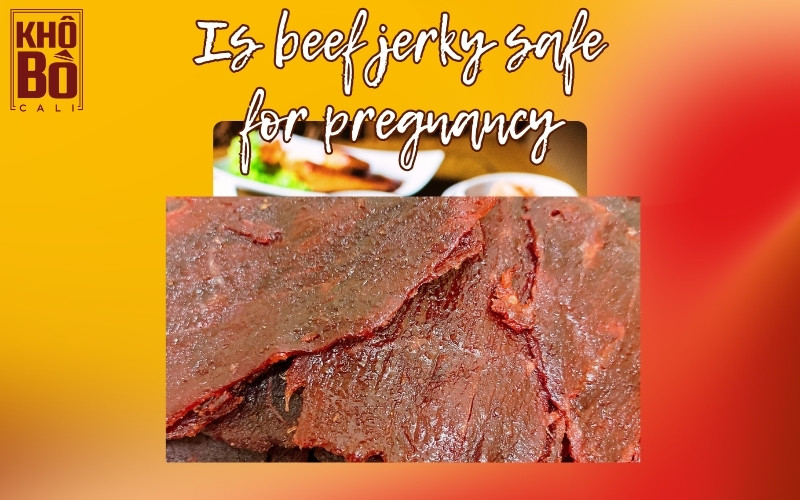During pregnancy, a woman’s body undergoes many changes, and she needs to follow specific nutritional guidelines while avoiding certain foods. For those who enjoy beef jerky, considering whether it is safe to consume during this period becomes an important question. Let’s explore the answer to the concern: is beef jerky safe for pregnancy in the article below
Is Beef Jerky Safe for Pregnancy?
Many expectant mothers often wonder: is beef jerky safe for pregnancy? While this snack is loved by many, it raises questions about its suitability during such a sensitive period.
Beef jerky is a popular snack, enjoyed not only on its own but also as an ingredient in various traditional dishes. Its rich flavor and convenience make it appealing, yet pregnant women need to be cautious about what they consume. According to nutrition experts, beef jerky itself does not pose significant risks to the health of the mother or the developing baby—provided it is produced, stored, and consumed under safe conditions.
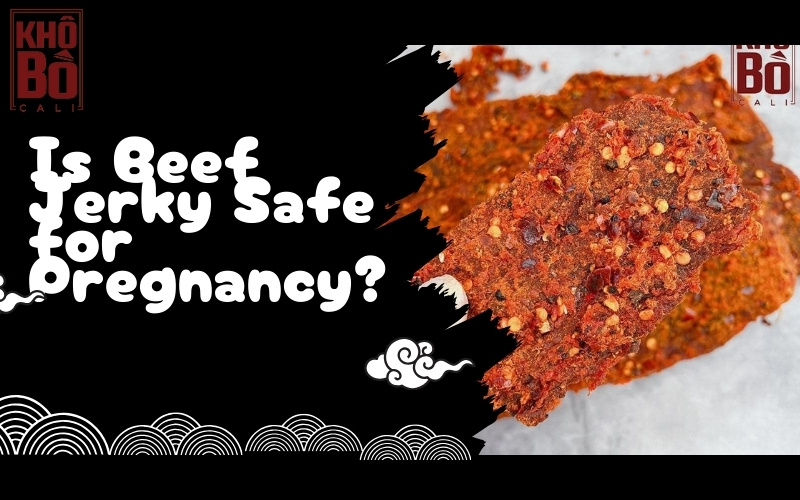
To minimize risks, expectant mothers are advised to choose beef jerky from trusted brands with clear origins, proper food safety standards, and ideally, non-spicy versions to avoid discomfort. Another safer option is preparing homemade beef jerky, which allows mothers to control the ingredients, hygiene, and seasoning.
Nutritionally, beef jerky provides valuable nutrients such as iron, protein, zinc, calcium, phosphorus, selenium, vitamin B1, manganese, copper, and essential amino acids—all of which play important roles in supporting both maternal health and fetal development. Therefore, when eaten in moderation and incorporated into a balanced diet, beef jerky can contribute positively to a pregnant woman’s nutritional needs.
As one nutritionist advises: “The consumption of beef jerky during pregnancy can be safe if done properly and in moderation.”
Potential Risks of Eating Beef Jerky During Pregnancy
Although it is possible for pregnant women to consume beef jerky, caution is strongly advised. Overeating this snack can lead to several health concerns that may affect both the mother and the baby. Some key risks include:
-
High salt and cholesterol content: Beef jerky is often seasoned heavily with salt and can be high in cholesterol. Excessive intake may contribute to high blood pressure, water retention, and an increased risk of cardiovascular problems during pregnancy.
-
Foodborne bacteria and parasites: If beef jerky is not properly prepared, cooked, or stored, it can become contaminated with harmful bacteria such as Listeria or parasites like Toxoplasma gondii. These infections are especially dangerous for pregnant women and may cause complications for the fetus.
-
Spicy seasonings and additives: Many types of jerky are made with chili, lemongrass, or other strong spices. While flavorful, these seasonings may irritate the stomach lining, increase acidity, or even trigger gastritis and stomach ulcers in sensitive individuals.
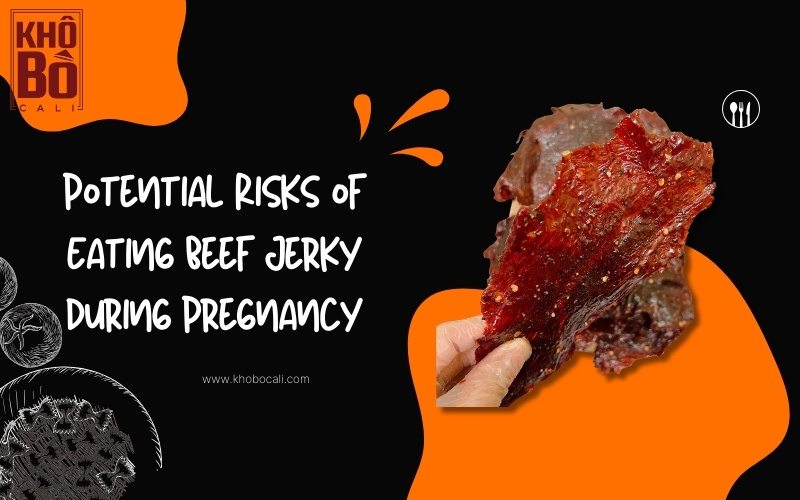
Nutrition experts therefore recommend that pregnant women limit their intake of beef jerky. Eating it occasionally and in small amounts may be safe, but excessive or careless consumption can pose potential risks to maternal and fetal health.
When Can Pregnant Women Eat Beef Jerky During Pregnancy?
Many expectant mothers often wonder not only when they can enjoy this snack, but also is beef jerky safe for pregnancy at different stages. In general, pregnant women can consume beef jerky at any point during pregnancy from the first trimester to the final months so long as it is eaten in moderation and prepared safely.
During pregnancy, the body undergoes numerous changes, and there may be specific times when eating beef jerky is less suitable. For example, women who struggle with nausea, heartburn, or digestive discomfort may find that spicy or heavily seasoned jerky worsens these symptoms.
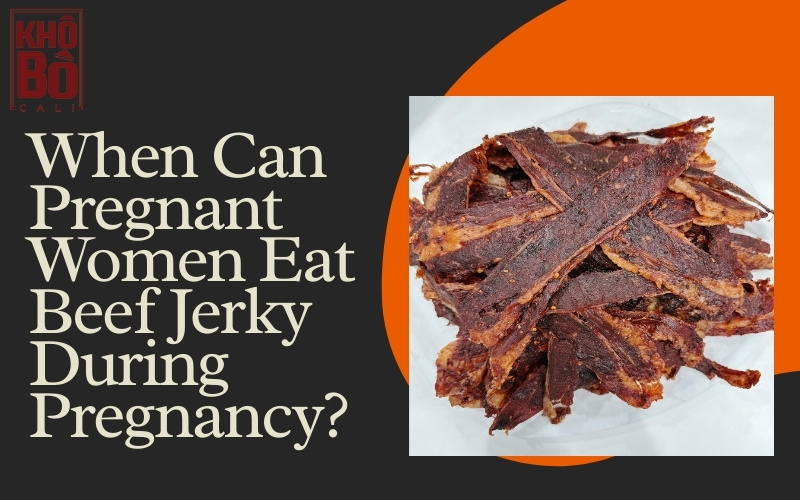
The key factor is ensuring food safety. Jerky should be thoroughly cooked, hygienically prepared, and properly stored to avoid bacterial contamination. Making homemade beef jerky is often a safer choice, as it allows mothers-to-be to control the ingredients and cooking process. When buying from stores, it’s best to choose reputable brands with clear labeling, certified safety standards, and ideally milder, non-spicy versions.
Ultimately, while beef jerky can be part of a pregnancy diet if consumed carefully, every woman’s body reacts differently. If you are unsure about whether jerky is appropriate at a particular stage, consulting with a doctor or nutrition specialist is the best way to get personalized guidance.
Readmore: Can Pregnant Women Eat Beef Jerky? Everything Moms-to-Be Should Know
Important Considerations for Pregnant Women When Eating Beef Jerky
Many mothers-to-be often ask: is beef jerky safe for pregnancy? While the answer can be yes if consumed correctly, there are several important precautions to follow in order to protect both maternal health and the baby’s development.
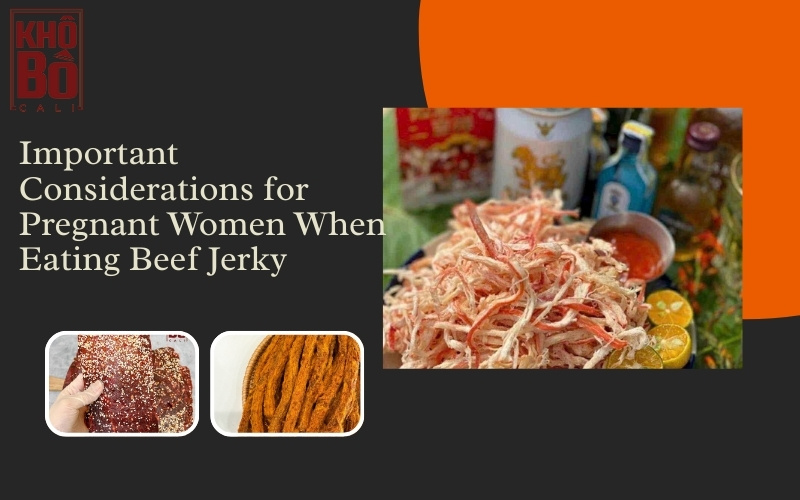
1. Choose high-quality products: Always select beef jerky from trusted, reputable sources with clear labeling and transparent origins. Products should be manufactured under strict food safety standards and stored properly to reduce the risk of bacterial contamination or food poisoning.
2. Check expiration dates carefully: Before purchasing or consuming beef jerky, make sure to verify the expiration date on the packaging. Eating jerky that is past its shelf life can significantly increase the chances of harmful bacteria growth and foodborne illness.
3. Limit consumption: While beef jerky provides protein, iron, and other valuable nutrients, pregnant women should consume it in moderation. Many commercial jerky products are high in salt and cholesterol, which can contribute to high blood pressure, water retention, and potential cardiovascular concerns.
4. Avoid spicy or heavily seasoned varieties: Jerky flavored with chili, lemongrass, or excessive spices can irritate the stomach lining, trigger heartburn, or even worsen gastritis and ulcers. Choosing milder, less seasoned options is generally safer for pregnant women.
5. Ensure safe preparation and storage: If making jerky at home, proper hygiene, thorough cooking, and correct storage methods are crucial to prevent bacterial contamination and spoilage. Homemade jerky allows greater control over ingredients and seasoning, but safety measures must still be followed strictly.
6. Seek professional advice when in doubt: Because every pregnancy is unique, it’s best to consult with a doctor or nutrition specialist before including beef jerky in the diet. This ensures the safest approach for both mother and child.
In summary, for those still wondering is beef jerky safe for pregnancy, the answer is that it can be provided it is eaten occasionally, sourced from safe producers, and consumed in moderation. Adhering to food safety principles is essential to protect both the mother and the developing baby.
Frequently Asked Questions About Eating Beef Jerky During Pregnancy
Is it safe for pregnant women to eat beef jerky?
Most nutrition experts agree that consuming beef jerky during pregnancy does not pose significant risks to the health of the mother or the baby.
However, it is crucial to ensure that the jerky is of good quality, properly prepared, and safely stored to avoid contamination.
Does beef jerky provide important nutrients for the mother and baby?
Yes. Beef jerky contains several essential nutrients such as iron, protein, zinc, calcium, phosphorus, selenium, vitamin B1, manganese, copper, and amino acids.
When consumed in moderation and as part of a balanced diet, these nutrients can support both maternal health and the baby’s growth and development throughout pregnancy.
What are the potential risks of eating beef jerky during pregnancy?
Pregnant women should limit their intake of beef jerky to avoid possible health problems.
This snack is often high in salt and cholesterol, which may contribute to high blood pressure and an increased risk of cardiovascular issues.
Additionally, if jerky is not processed or stored correctly, it can become contaminated with harmful bacteria such as Listeria or parasites like Toxoplasma gondii.
Spicy varieties, especially those flavored with chili and lemongrass, may irritate the stomach, trigger heartburn, or even worsen gastritis.
What precautions should pregnant women take when eating beef jerky?
Expectant mothers should always choose jerky from reputable sources with clear labeling and safety certifications.
They should avoid products with excessive salt, cholesterol, or strong spices such as chili and lemongrass.
If preparing beef jerky at home, proper hygiene, safe cooking, and correct storage are essential to prevent foodborne illness.
In all cases, it is best to consult a doctor or nutrition specialist if there are any concerns.
Are there healthier alternatives for pregnant women to get nutrients?
Yes. In addition to beef jerky, pregnant women should diversify their diet with nutrient-rich foods.
Good options include leafy green vegetables, fresh fruits, iron-rich foods such as legumes, liver, fish, and chicken, as well as nuts, seeds, tofu, milk, and dairy products.
Maintaining a balanced and varied diet is the best way to ensure that both mother and baby receive the necessary nutrients for healthy growth and development.
Conclusion
Pregnancy is a time when every food choice matters, and even popular snacks like beef jerky require careful consideration. While beef jerky can provide valuable nutrients such as protein and iron, it also comes with potential risks if consumed in excess or prepared unsafely. By choosing high-quality products, limiting portions, and consulting with healthcare professionals, expectant mothers can enjoy peace of mind when making dietary decisions.
So, is beef jerky safe for pregnancy? The answer is that it can be provided it is consumed in moderation, sourced responsibly, and incorporated into a balanced diet that supports both mother and baby throughout the pregnancy journey.

